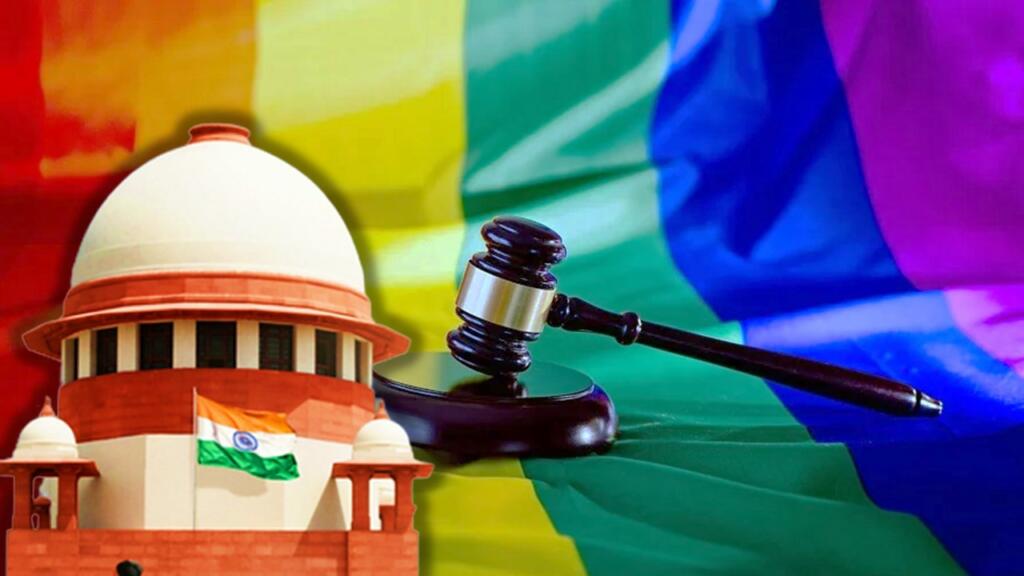Same-sex marriage: After months of discussions and some controversial observations, the Supreme Court of India has finally reached a decision on the legal validity of same-sex marriage. The Court’s ruling emphasizes the need for amendments to the Special Marriage Act, placing the responsibility on the Parliament. However, the question remains: has the ‘woke brigade’ emerged victorious? Probably not.
Led by Chief Justice of India Chandrachud, the Court’s judgment recognized the rights of LGBTQ+ individuals and attempted to quell the notion that ‘homosexuality’ is confined to urban areas. According to CJI Chandrachud, “There is no evidence to support the notion that only married heterosexual couples can provide stability to a child. The CARA circular denying adoption rights to queer couples infringes Article 15 of the Constitution.”
However, when it came to implementing the legality of same-sex marriage, the Supreme Court has officially deferred the decision to the Parliament. An excerpt from their statement reads, “The need for changes to the Special Marriage Act falls within the legislative domain of the Parliament. This Court must refrain from intruding into legislative matters.”
Supreme Court after wasting weeks of their precious time on discussing Same Sex Marriage says,
"This Court must be careful to not enter into legislative domain"
They should not be paid salary and other perks for the time they have wasted in discussing Same Sex Marriage.…
— Facts (@BefittingFacts) October 17, 2023
Marriage Equality Case: Key Highlights From The Landmark Hearing
Whether a change in the regime of the Special Marriage Act is required is for the Parliament to decide. This Court must be careful to not enter into legislative domain, says CJI.#SameSexMarriage pic.twitter.com/2pFSrOTep4
— TIMES NOW (@TimesNow) October 17, 2023
Also read: Woke teen approached the Supreme Court to make them gender neutral, was made to forget his pronouns!
For a rare moment, the Court acknowledges that it cannot pressure the Executive branch into carrying out its desires. The responsibility now falls on the Central administration to prevent this nuisance from becoming mainstream. Many states and advocates have opposed CJI Chandrachud’s high-handed efforts to implement same-sex marriage without proper discussion and consultation, and the Court’s decision to hand over the matter to the Executive signifies its limits in certain cases.
With the burden now placed on the Executive, it is uncertain whether the majority of Indian states will support the implementation of what they view as an impractical law designed to appease a minority group of deranged individuals.
While the Court’s judgment indicates a significant step towards recognizing LGBTQ+ rights, the path to achieving same-sex marriage in India remains uncertain. Chief Justice Chandrachud’s observation that children can experience stability and support in diverse family structures challenges traditional stereotypes. However, the fact remains that the opinion of an individual cannot be the norm for the whole nation, and in a way, CJI Chandrachud has grudgingly acknowledged that.
The Supreme Court’s decision to pass the responsibility to the Parliament raises questions about the prospects of same-sex marriage becoming a legal reality. The Court has made it clear that it cannot overstep its jurisdiction in this matter, acknowledging the complex and polarized sentiments within Indian provinces.
As the Court defers to the Executive, it remains to be seen whether the Central administration will take the initiative to amend the Special Marriage Act to accommodate same-sex marriage. The onus is now on the Parliament and the government to navigate these complex waters, and this raises questions about the political will to bring about such significant changes.
Long story short, the Supreme Court has backed out of bullying the Executive into implementing the ‘same-sex marriage’, as they know about the repercussions of the same. Besides, progressivism should be viewed as ‘a fine balance between the minority and the majority’, and not pave way for the ‘tyranny of the minority’. Besides, Supreme Court has better issues to look forward to, instead of wasting time on such useless issues that will benefit none in the long run.
Support TFI:
Support us to strengthen the ‘Right’ ideology of cultural nationalism by purchasing the best quality garments from TFI-STORE.COM.
